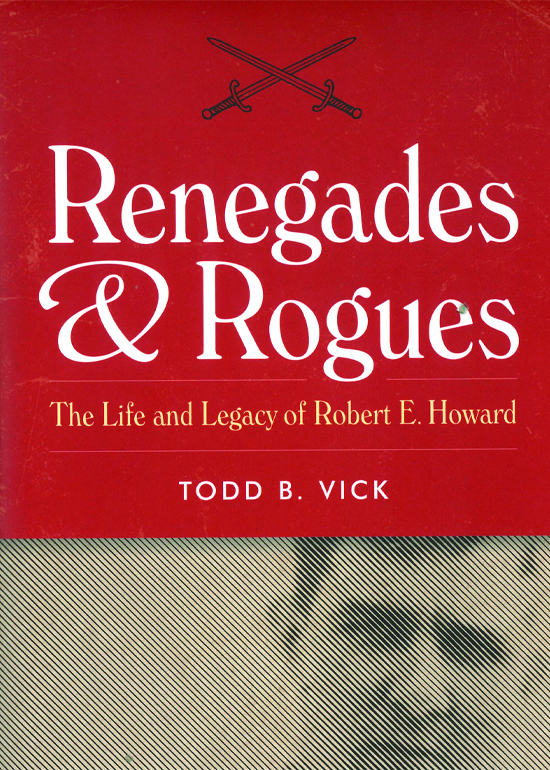Cowboys Had To Be Free

Renegades & Rogues: The Life and Legacy of Robert E. Howard
by Todd B. Vick
Austin: University of Texas Press, 2021.
240 pp. $29.95 Hardcover.
Reviewed by
Hunter Mueller
From the opening chapter, Todd B. Vick sets out to answer the question, “Who is Robert E. Howard?” Howard’s legacy—like his friend and fellow writer H. P. Lovecraft’s—has surpassed himself. Characters such as Conan the Barbarian and Solomon Kane are names more recognizable than Howard’s, though his impact is hardly one to be taken lightly. Indeed, Howard’s body of work has inspired numerous writers, as well as become a foundational pillar of the fantasy-adventure and sword & sorcery genres. To understand such a prolific author, Vick takes the readers on a tour of Howard’s troubled life and asks them to consider the same question he poses; who is Robert E. Howard, and what insights into his fiction can be gained from surveying his life?
Vick presents a concise, effective, and evocative account of Howard’s family, life, and influence. Though a self-professed avid fan of Howard’s work, Vick is also a thorough and consummate researcher. Starting from Howard’s ancestral origins during the late nineteenth and early twentieth centuries in Texas, Vick quickly catches the reader up to Howard’s early life. Encouraged by his parents, Howard fell in love with classic literature and the early pulp writing of the time. Soon after, this love transitioned from pure admiration to creation, and Howard began writing fiction inspired by the tales he had absorbed. Publishing in local newspapers and outlets, Howard’s early work received praise but little income. It was not until much later that Howard would receive a modicum of income from his writing. Howard worked various jobs while pumping out stories that pushed genre boundaries and subverted conventions. After a number of rejections, he managed to publish in Weird Tales, an outlet of strange fiction for authors such as August Derleth and H. P. Lovecraft. Howard would strike up a long correspondence and friendship with Lovecraft, which would greatly shape him and his writing. Throughout producing a vast body of work, Howard remained entangled with financial burdens, struggling relationships, and the emotional encumbrance of his family members' health. All took their toll on Howard. Shortly before his mother passed away from uncertain health issues, Howard took his own life. Despite a short and tragic life, his creations would continue to endure and influence, becoming hallmarks of Texan fictional writing and the source of inspiration for many writers afterward.
Vick’s account of Howard’s life is captivating, providing a fair amount of context for much of what Howard experienced, and in those moments where the views of Howard from another source come into play (Novalyne Price, Lovecraft, etc), Vick takes care to present their views of Howard with as little bias as possible, providing insight into his fluctuating and complexing character. Vick’s prose style is also easy to grasp and is devoid of any unnecessary jargon, making it that much easier to keep turning the pages. This, paired with the wonderful analysis of the context in which Howard created his works, lets the reader get a grasp of who Howard was and why he matters. However, while his prose paints a pretty picture and makes this account easy to engage with, there are some areas in which Vick could have given more attention and detail. Particularly, showcasing more direct thoughts from Howard over his correspondence and letters and diving even deeper into his philosophies would have provided an even more in-depth analysis of Howard and his mind. Vick often ventures into these territories, but if there is one notable flaw in this biography it is that it could have benefitted from being longer, as some areas feel as though they are only scratching the surface without seeing what truly bleeds underneath, though scholars of Howard can likely find additional answers in other, similar scholarly sources. Yet despite this, Vick’s research provides a sufficient answer to the initial question, an account of a struggling young man who was able to create evocative adventure fiction that is still being discussed in the twenty-first century.
Though it could have provided more detail and exploration of Howard’s views, Rogues & Renegades presents a quick and engaging account that provides a reader with an introductory survey of Howard’s life and works. This book serves as a great steppingstone from which one could venture further into studying Howard and is an exciting and easy read for anyone even just casually interested in this fascinating and imaginative character from the North-central Texas.
Hunter Mueller is a graduate student in the MLA program at Texas State University. An avid student of horror, occultism, religion, philosophy, and fiction, Hunter’s interests span a plethora of genres and fields, all of which he engages with whilst continuing to be tattooed and exploring his personal creative endeavors. He lives in Brenham, Texas, with his wife Chelsea.
